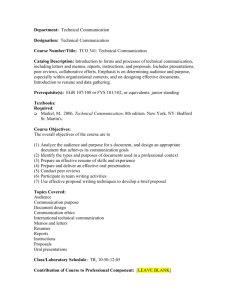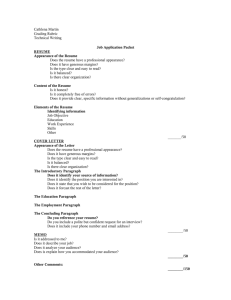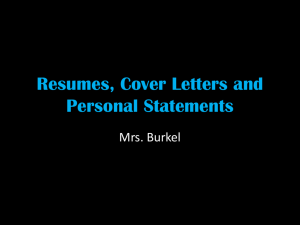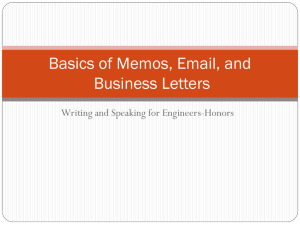Technical Communication
advertisement
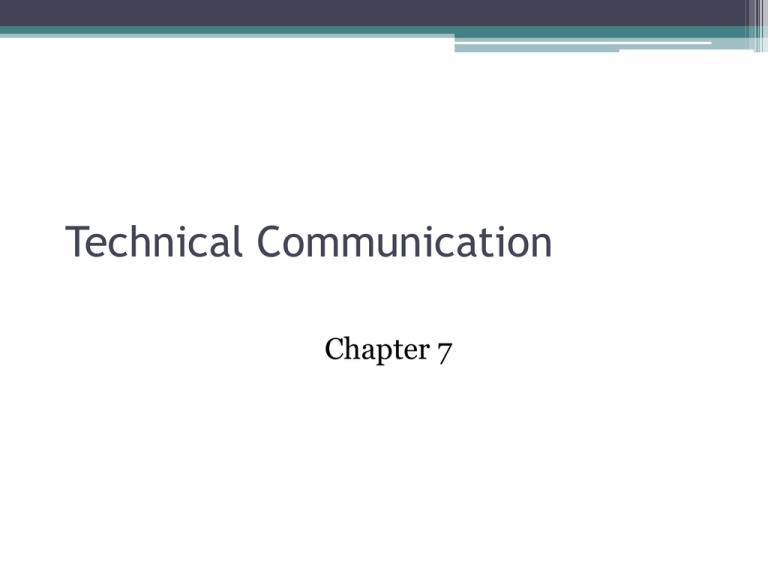
Technical Communication Chapter 7 Effective Communication • • • • • • Transfers vital info Provides a basis for judging your knowledge Conveys your interest and competence Increases the knowledge of others Identifies to you the gaps in your information Allows you to carry out desired changes Communication and Engineering • Must possess technical skills • Strong communication and teaming skills lacking in entry-level candidates • Golden Rules of Communication for Engineers: ▫ Brevity is best ▫ Using a shorter, simpler word is typically preferable to a longer, more difficult word. Minimal Time Decsion-Makers for Communication • Language using suited to audience? ▫ Do you know how to communicate effectively ▫ Do you need to expand your communication skills • What being said clear to readers? ▫ Readers draw same conclusions you did ▫ Words, phrases, ideas that lead to multiple interpretations • Do you know your audience? ▫ Unique preferences, hidden expectations ▫ Feelings about things being communicated • Know how your audience perceives things? ▫ Do all engineers see things the same way ▫ Audience of non-engineers interpretations Oral Communication Skills http://www.drdudd.co.uk/homelife/HomeMain.htm Formal and Informal Presentations • Formal ▫ Preset time and date Preparation needed ▫ May be made to: Colleagues Expert panels Design Competitions Conclusion projects Conferences Workplace ▫ Presentation software Handouts of slides ▫ Business attire • Informal ▫ Short ▫ Preparation time less ▫ Impromptu Business context Technical meeting Meeting involving a design team Best Presentation Qualities • Give valuable info not have had otherwise • Be in a form to be put into immediate use • Motivate and inspire the audience to want to put the info to immediate use Techniques Dealing with Nervousness • Breathing to avoid adrenaline overdrive ▫ Practice Square Breathing 7 seconds in, hold 7, 7 out, hold 7 • Visualize successful presentation • Tailor the talk to your strengths ▫ ▫ ▫ ▫ Use humor Use props Use your nervous habit Use trivia • Have presentation ready at least 1 day before Preparation for Presentation • Identify purpose and audience • Organize information • Gather information needed to present • Create presentation material with maximal audience impact • Practice your presentation after it is prepared Identify Purpose and Audience • Know your audience ▫ How many people? ▫ How well do you know audience members? Small audiences who are known, use names ▫ What is the background of listeners ▫ What are the expectations Information, tone, level of formality ▫ What does audience know about the topic ▫ How long is your allotted time to speak Organization of Presentation • Have a one-page summary ▫ Presentations longer than 5 minutes ▫ Beginning of speech, let’s audience preview what is coming ahead • Use the power of repetition ▫ “Tell them what you’re going to tell them, tell them, then tell them what you told them” • Provide written supplement ▫ Helps audience focus on what you are saying ▫ Not bogged down with writing presentation down Organization of the Information • Introduction ▫ Who you are and why you did this • Need ▫ Why your engineering design needed • Solution ▫ You have the design that addresses the need, and here it is. Include major design features • Bottom Line ▫ Benefits and cost • Conclusion Gather Information Needed to Present • Information should pertain to 3 - 5 main points • Use graphics, pictures and photos ▫ Communicate a lot of info concisely • Do not include too much or too little info ▫ Approx 1 slide for every minute of speech Do not exceed 30 seconds on 1 slide Maximal Audience Impact in Presentation • KIS ▫ Keep It Simple • Audience will remain with you ▫ Accessible language ▫ More than one way the information is provided http://www.rocktrip.net/imagenes/clasicos/Kiss/kiss-band.jpg Maximizing Visual Impact • One central idea per slide • Font size important • • • • • Speaker may add details when needed Orally identify/locate colors to help listeners Use high contrast colors DO NOT USE ALL CAPITALS Graphs & Charts more effective than Tables Maximize Visual Impact • • • • • • • The more a Pointer needs To Be Used The worse the slide • Keep it Simple Maximize Visual Impact • Try to be as brief as you possibly can in creation of these PowerPoint slides because you do not want to overload the audience with unuseful information • Cluttered slides are hard to read and cause the audience to focus their attention somewhere else (Kind of like what most of you are doing right now) • Two clear understandable slides are better than one cluttered slide Maximize Auditory Impact • Be an enthusiastic speaker ▫ “There are no boring topics, only boring presentations.” • Master your subject ▫ Read the audience, not your note cards • Use pauses to your advantage Kinematic Methods • Engages audience • Make sure everyone can see a demonstration ▫ Point out major concepts and ideas • With direct engagement, assist audience through step-by-step process ▫ “Has everyone finished this step.” How would you like this in front of you at a ballgame? http://www.cjbaseball.com/TSLower1.htm Practice, Practice, Practice • Practicing presentations out loud allows for insight into technique • Will know how long presentation goes • More familiar you become with a topic • Showing the audience you are familiar with the topic will make them and you more confident in the subject Getting Started • • • • • First 10 - 30 s critical Introduce yourself and topic Establish level of formality Establish tone Interaction with audience establishes rapport • Monitor audience during Presentation Hardware How does this work!? • Know how the equipment works beforehand • Overheads • Ensure video projection system is compatible ▫ May bring your own just in case http://www.oregonl5.org/l5ohead1.html Written Communication Skills Grammatical Issues • Each paragraph should address a single topic • Avoid cliches • Its and It’s ▫ Its = Denotes possession ▫ It’s = It is • Affect and Effect ▫ Affect - Verb To Influence ▫ Effect - Noun Result The Audience • Ask yourself ▫ “Who is going to read this, anyway?” • Consider needs and perspectives of audience • Technical material needs to be clear and concise Technical Writing • Identifies the main premise early on • Is clear, objective, and economical • Follows a specific format • Takes a problem-solving approach • Involves specialized vocabulary • Incorporates signs, symbols, formulas, graphs, and tables • Documents completed work Unique Aspects of Technical Writing • Content ▫ Factual and objective • Methodical Construction ▫ Present most essential info first, followed by supporting statements • Clarity • Objectivity ▫ Unemotional and unbiased • Importance in Workplace Formats of Written Communication • Brief notes to a superior peer • Hand-written reminders • Informal reports • Memos • Formal reports • Visual presentations http://www.pha.jhu.edu/~mstone/Kerr/overhead1.html Formal Reports • Title ▫ Brief, clear, and appropriate introduction • Summary ▫ What was attempted, how accomplished, and what the implications are • Table of Contents ▫ Each heading listed found in report with page number • Nomenclature ▫ List and define all symbols used in report Formal Reports • Introduction ▫ State the motivation of experiment and background information • Analysis ▫ Begin with basic, general relationships and proceed to specific formulas used in interpretation of data ▫ All relevant mathematical steps presented • Experimental Procedure ▫ Schematic representation of experiment equipment or simulation program Formal Reports • Results ▫ Short, declarative statements of the results which summarize specific data presented in graphs or tables • Discussion ▫ Interpret results, what was expected, what was unexpected, and what is of technical interest • Conclusions ▫ Concise statements that clearly communicate what results indicate Formal Reports • References ▫ Author’s last name, then first and middle initial List coauthors with initials first ▫ ▫ ▫ ▫ ▫ ▫ ▫ Title of source quoted Edition of source Volume of source (if applicable) City of publication (from source’s title page) Publisher Date of Publication Pages references Formal Reports • Example References ▫ Gomez, A.G., W.C. Oakes, and L.L. Leone. “Technical Communication,” Engineering Your Future. Edition 1, Okemos, MI. Great Lakes Press, Inc. pp. 151 - 180 ▫ Serge, E., ed., Experimental Nuclear PhysicsI, 1st ed., Vol. 1, New York: Wiley, 1953,pp. 6-10 Formal Reports • Appendices ▫ Lengthy calculations and side issues not related to main theme placed here ▫ Is the piece required as part of the investigation for the report? No = Appendix Communication Checklists • Checklists make sure you have included everything in the report that is needed • Customized Checklists can be made for each communication format • Formal Report ▫ Title Page Title of Paper Course/Project Date Due Section Meeting Time Name ▫ References Initials for first name All necessary info included References numbered in text lines like this: [1] Other Types of Communication Executive Summaries • Assumes managerial perspective instead of technical one • Presents simple facts and describes key elements in nontechnical language • Contains enough info for clear decisions ▫ ▫ ▫ ▫ Background of situation/problem Cost Factors Conclusions Recommendations Proposals • Address a specific need and describe the problem at issue, define a solution, and request funding or other resources to solve a problem • Request For Proposal (RFP) guidelines ▫ ▫ ▫ ▫ ▫ What the proposal should cover What sections it should have When it should be submitted To whom it should be sent How evaluated with regard to other proposals Proposal ABC Format • A: Abstract ▫ ▫ ▫ ▫ Purpose Reader’s main need Main features you offer and related benefits Overview of proposal sections to follow Proposal ABC Format • B: Body ▫ ▫ ▫ ▫ ▫ What do you want to solve and why? What are the technical details of your approach? Who will do the work, and with what? When will it be done, and how long will it take? How much will it cost? Proposal ABC Format • C: Conclusion ▫ Emphasize a main benefit or feature of your proposal ▫ Restate your interest in doing the work ▫ Indicate what should happen next Memos • Convenient, relatively informal way to communicate the existence of a problem, propose some course of action, describe a procedure, or report the result of a test • Must be carefully prepared, thoughtfully written, and thoroughly proofread for errors Memos • Introduction ▫ Summarizes memos purpose • Conclusion ▫ Restates the main points and contains recommendations Title Format for Memo • To: • • • • • • name, job title department organization From: name, job title department organization Subject: (or “Re:”) issue addressed in memo Date: date Dist: (Distribution) list of others receiving memo (if applicable) Encl: (Enclosure) list of other items included (if applicable) Ref: (Reference) list of related documents (if applicable) Email • Use proper grammar ▫ Appropriate sentence structure, subject/verb agreement, spelling, flow • Carefully proofread, edit, and spellcheck • Think about response before sending ▫ Wait as long as possible before sending a response, even if you only have an hour Email Cautions • Never use when face-to-face dialog is needed • Do not use when formal documentation is required ▫ Does not carry status of formal report • Not as private as you think Progress Reports • Attractive and easy to understand • Introduction ▫ Scope of work being done, purpose of the work, and any major changes that have been required • Project Description ▫ Completed phases, time taken to complete, and phases to be completed • Summary ▫ Summarize main points of action and reiterate where you are along the road to completion Problem Statements • Explicitly states problem to be investigated and outlines course of action to be taken • Correctly defining problem is vital ▫ Work with data you have already collected ▫ Consult contacts who have knowledge of the problem ▫ Investigate the problem first-hand Cover Letters • Sent along with resumes and transcripts to potential employers • Introduces you to the company in a conversational manner • Opportunity to communicate what you have to offer to them • May open doors if written properly or slam them shut if written poorly Specifics in a Cover Letter • Date, your address and phone number, and the name and address of the person to whom you are writing • 1st paragraph ▫ Introduction of yourself, reason you are writing the letter, source of your information about the employer, and position for which you would like to apply • 2nd paragraph ▫ Brief resume description, hitting highlights Specifics in a Cover Letter • 3rd paragraph ▫ “Current” information which may not yet be appropriately included in your resume Courses taking, research involved in, activities about to engage in • 4th paragraph ▫ Summary paragraph thanking reader “in advance” for consideration Resumes • Sells you and your qualifications • Two main types ▫ Skills Resume No significant work experience Highlights skills and talents to benefit the potential employer ▫ Experience Resume Highlights prior work experience relevant to job being applied for Resumes • Many formats for resume, must include essential information ▫ Name ▫ Address ▫ Phone Number ▫ Educational Background ▫ Previous Employment ▫ Extracurricular Activities • Highlight key elements in BOLD • Have many people critique your resume and evaluate all comments, tailoring to fit you Resume Checklist • Information ▫ Objective clearly stated ▫ Objective supported by education, experience, activities, and honors ▫ Experience, education, and/ or skills segment are effective ▫ Al activities, honors, and other data are appropriate for the employment and the reader Resume Checklist • Organization ▫ Name and key headings stand out ▫ Information within each heading is ordered from most to least important ▫ Experience segment is arranged to highlight your strengths and career objective Resume Checklist • Style ▫ Language is simple, direct, and precise ▫ Noun phrases are consistently used to describe experience, skills, and activities ▫ Parallel structure is used effectively ▫ Have no errors in grammar, punctuation, or spelling (no typos whatsoever) Thank-You Letters • Thank the individuals who interviewed you for the position applied for • Do not wait more than 48 hours to send • Businesslike and concise • May put you ahead of the competition Thank-You Letter Contents • 1st paragraph ▫ Thank the interviewers for their time and reiterate your interest in working for their company • 2nd paragraph ▫ Briefly restate your qualifications ▫ Address any positive qualities failed to mentioned during interview Thank-You Letter Contents • 3rd paragraph ▫ Close with a final thank-you ▫ Express interest in hearing back from the interviewer ▫ May give specific timeframe to when you will follow up with a phone call ▫ Provide interviewer with phone numbers where you can be reached and e-mail address • Additional Advice ▫ Personalize each Thank-You Letter ▫ May open other doors or future opportunities
